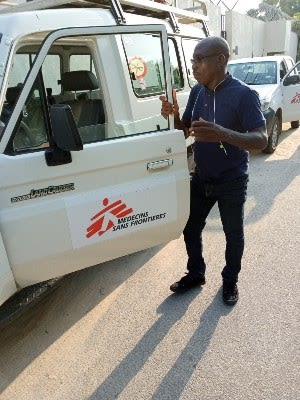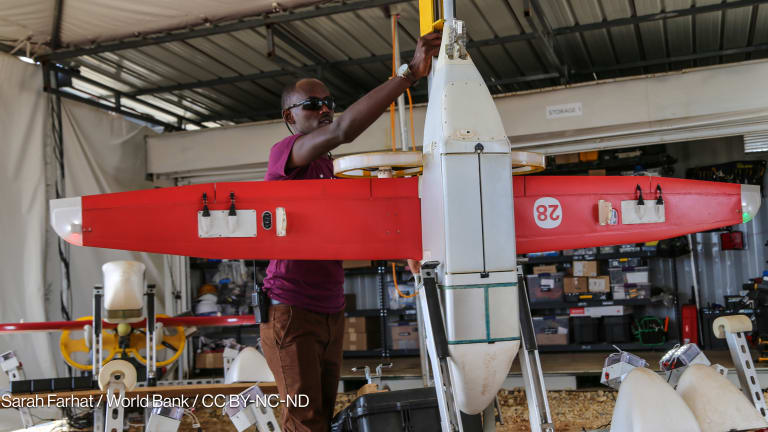
Passionate about driving and mechanics since he was a child, Gnabry Kouassé Jean Bosco works as a driver with Médecins Sans Frontières in Côte d'Ivoire. On some days, he is delivering equipment and picking up international staffers from the airport, while at other times he is transporting patients or negotiating with armed groups.
Upon joining the organization in 2000, Bosco got his first taste of humanitarian work as part of a team providing medical care to prison detainees in Abidjan. He has since supported several emergency response efforts, including MSF’s therapeutic nutritional unit in Guiglo and the reopening of a looted hospital in Toulépleu.
The work is often far more complex than many imagine. Bosco described being the only member of the MSF team able to accompany malnourished children and their mothers to a nutritional therapeutic feeding center during the 2002 Ivorian conflict due to the risk of passing armed groups. “I was solely responsible for their safety, [and] I still appreciate the heavy responsibility that this may have been for me. I had to arm myself with courage [and] could feel the trust the mothers put in me,” he said.
“I am the invisible eyes and the ears of the team.”
— Gnabry Kouassé Jean Bosco, driver, Médecins Sans FrontièresWhile the job can involve working in hostile contexts, Bosco draws his strength from being able to help vulnerable communities and said he is willing to support projects no matter the situation. In recent months, COVID-19 has created new challenges. But “when you have worked under the bullets, you are seasoned” in dealing with stressful situations, he said.
Bosco spoke to Devex about the dangers of the job and what motivates him to keep going. This conversation has been edited for length and clarity.
What does being a driver for a humanitarian organization involve?
Drivers are responsible for the safety of the people they transport. … Important [aspects] in the [day-to-day work] of the driver are safety — especially that of the passengers and the materials being transported — and the good condition of the vehicle. If it isn’t in good condition, we can’t transport people safely. My daily life looks a bit like the life of a half mechanic.
The driver [also] listens to what people in the community are saying about MSF … and, if needed, I report it to the team later. They can [then] use the information to focus the activities in this or that direction. I am the invisible eyes and the ears of the team.
I am also the messenger of the organization, responsible for the distribution of mail and important documents, [and] I pick up [and drop off] international staff who arrive for their assignments in Ivory Coast. The driver is therefore the very first contact an international staff member has with MSF in the country ... and the last contact when they leave. I also race around driving the rest of the team to where they need to be.
[When working as part of] MSF projects ... I am responsible for ensuring that the equipment that the medical staff use for their work is in good condition and loaded into the vehicle. Once we are at the site, [I] unload the equipment and supplies and help to organize the patients awaiting care. If it is a case of an emergency evacuation, the driver is responsible to ensure everything is in place to transport the patient.
What are the greatest challenges of the job?
The greatest challenges [are] in times of emergency, like being under fire in Bouaké city, located about 350 kilometers [220 miles] from Abidjan. I traveled [there] before Sept. 19, 2002, and we remained [trapped] with another colleague after the outbreak of war. We were able to resume [on] the road to Abidjan a few days after in an MSF vehicle, accompanied by the emergency team. … [But] we were forced to detour and sneak along other rough paths to [avoid] going to Bouaké [the heart of the conflict].
The first MSF vehicle that returned was the one I was driving. At the entrance of Bouaké, we saw vehicles on fire. The rebels were heavily armed and were obviously not happy to see us. They searched the entire vehicle; they thought we were spies. I was the only Black African, and the rest of my colleagues were white.
We explained [that] our mission was to help the people who remained in the city because the doctors had fled, and [they] facilitated our interventions thereafter. It was my first experience in an emergency situation, and I knew that in such circumstances you should never turn off the engine of your vehicle, in order to be able to evacuate the location as quickly as possible.
[At] times, people who don't know MSF can spread false information. … It’s often political. ... I have never hesitated each time to remind people of our mandate, our identity, and [that] our principles [are to be] apolitical, neutral, and impartial.

What skill sets have you found to be most valuable or have helped you progress in your career?
I learned that you have to rely on yourself for everything, trust yourself, and don’t stray from the team when you are on a project location — watch what they do, stay close to them in order to learn, and listen. It can help in knowing how to respond to a person or how to get out of a situation when you are alone. … I also learned that you have to stay calm, keep a low profile, and play the diplomacy card in certain complicated situations.
MSF also gave me the opportunity to develop supervision skills when [I] filled in for a logistician for a while.
How do you see the impact of your work?
If there is no driver, the intervention will not take place. I’m proud and believe that the impact of my work is positive and constructive in that it contributes to the advancement of the mission … and to protecting the patients who are already in a vulnerable situation.
In Guiglo [after the war], the MSF nutritional center was overflowing with babies. People would arrive every day from [far parts of the country], and every day it was more people than the day before. More than 200 babies [were in need of treatment], and our staff tried to save them at all costs. I sometimes wonder: If MSF hadn't come, what would have happened to them? Even today, some years later, the images fill my head as if I had lived the experience last week.
What advice would you have for other professionals looking to work in this type of role? Is there any training you would recommend they invest time in?
Before coming to MSF, I obtained my national first aid certificate. [Since joining the organization] I was recently trained in security in case of an attack. Also, for both old and new drivers who wish to work in this field, I would recommend in-depth courses in mechanics, refresher courses on general driving and mechanical knowledge, and courses to practice foreign languages such as English [and] Spanish, [since] not all of our international colleagues are bilingual.
In addition to that, training in first aid would be welcome. In the event of an accident, we don't intervene, but … [if there is no doctor there] it is a question of securing the patient before the arrival of help.








